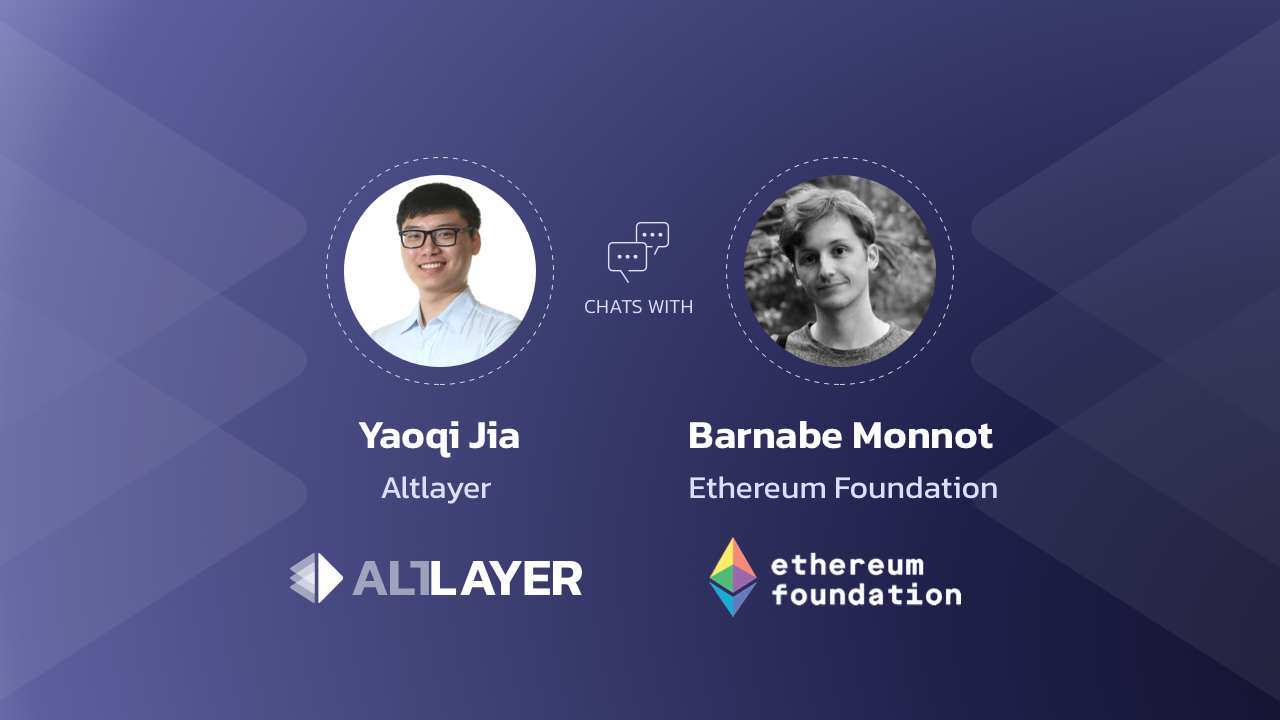
We kick off our Youtube show Alternative View or ‘Alt View’ this week! A no fuss, knowledge-focussed content channel for all things crypto, blockchain, L2s, scalability, Web3 and more, we will be hosting numerous industry leaders and researchers who are at the top of their game. For our pilot episode, we were honoured to have Barnabé Monnot from the Robust Incentives Group (RIG), Ethereum Foundation. His research expertise spans game theory, like large systems, crypto economics, and also decentralised systems. Here’s a quick summary on what he had to say on the subject of rollups, PBS, MEV, and the general state of L2s today.
我们本周开始了 Youtube 节目 Alternative View 或“Alt View”!对于加密、区块链、L2、扩容、Web3 等所有事物,我们将提供一个简单、以知识为中心的内容频道,我们将接待众多处于行业领先地位的行业领导者和研究人员。至于试播集,我们很荣幸邀请到来自以太坊基金会稳健激励小组 (RIG) 的 Barnabé Monnot。他的研究专长涵盖博弈论,如大型系统、加密经济学以及去中心化系统。以下是关于他在以下内容的快速总结:对汇总、PBS、MEV 和今天 L2 一般状态不得不说的话。
Catch the full episode on our Youtube channel. Don’t forget to hit Subscribe!
我们的 Youtube 频道上可以观看 完整剧集。不要忘记点击订阅!
Summary
总结
-
Barnabé first touched upon proposal builder separation (PBS), a design philosophy for protocol. The idea behind it is that in block construction (the roles that validators today have in the system of making blocks) there are specialised aspects, which can potentially be done by people rather than the validators themselves.
Barnabé 首先谈到了提案构建器分离 (PBS),这是一种协议的设计理念。其背后的想法是,在区块构建中(如今验证者在制作区块的系统中所扮演的角色)有一些专门的方面,这些方面可能由(众)人而不是验证者自己来完成。 -
He explained: “We can outsource bouts of block construction to players or to entities that are not necessarily part of the protocol. And the rationale behind the scenes, but do you have these filter things that intervene in block construction, you always ensure that block verification, so the fact that the data, so even full nodes that are not participating in the consensus, they are still able to verify the work. Verification remains cheap.” Specialised parts of block construction are done by actors who have maybe better resources or better knowledge of how to do it.
他解释说:“我们可以将区块构建外包给玩家或不一定是协议一部分的实体。幕后的道理,是你有没有这些过滤器介入区块构建的东西,(如果)你总是确保区块验证,所以数据的事实(是),即使是不参与共识的全节点,他们仍然能够来验证工作。验证仍然很便宜。”区块构建的专门部分由可能拥有更好资源或更了解如何操作的参与者完成。 -
There are many ways to formalise PBS. Question is, what is the best way to do it? Most of PBS is done out of protocols. But when you see that the protocol starts depending so heavily on a third party network, but the protocol doesn’t necessarily have a view into it, there should be considerations about whether some of it can be brought back into the protocol. However, one must exercise caution before bringing too much into the protocol first as making changes to a protocol can be complicated.
有很多方法可以使 PBS 形式化。问题是,最好的方法是什么?大部分 PBS 都是在协议之外完成的。但是当你看到协议开始严重依赖第三方网络,但协议不一定对其有态度时,应该考虑是否可以将其中的一部分带回协议中。但是,在对协议进行过多更改之前,必须谨慎行事,因为对协议进行更改可能会很复杂。 -
MEV (Maximal extractable value) and PBS: Our guest stated that MEV is a deep reason why we are getting to PBS in a more formalised way. He explained: “MEV is when you send a transaction, as a user, sometimes your transaction exposes more value that can be captured. For instance, if you do a trade, there might be a possible arbitrage after your trade. And so people will see your transaction, they really want to be the next transaction, so that they can capture that arbitrage. And so to to extract any value, you need, kind of two things you need first, knowledge, so information that this is a strategy that I can deploy and capture the value. And the second thing, which is I would say, not necessary, but it’s kind of ultimate power is to be the proposer.” The power really lies in the hands of the proposer.
MEV(最大可提取值)和 PBS 我们的客人表示,MEV 是我们以更正式方式进入 PBS 的深层原因。他解释说:“MEV 是当您发送交易时,作为用户,有时您的交易会暴露更多可捕获的价值(被别人截胡)。例如,如果您进行(可能存在套利)的交易,别人会看到你的交易,那他们真的很想成为下一笔交易,这样就可以抓住套利。因此,要提取任何价值,您首先需要两件事,即知识,这是我可以部署和获取价值的策略的信息。第二件事,我会说,没有必要,但它是一种终极权力,就是成为提议者/提案人。”权力真正掌握在提议者的手中。 -
Outsourcing for a fairer market? Barnabé noted that PBS might have a positive impact, if you are able to outsource and provide a fair market for everyone, when everybody kind of has the same return, there is no economies of scale. But you have to be very sophisticated to be a good builder, However, a common problem within this is the principal-agent problem — the idea that you’re outsourcing things to someone, that person might not share the same value function, as you’re saying, we might not want to make the block the way you would have made. So both good because you get more, but also bad because your preferences as a proposer might not be shared by the builder. One has to make a trade off between providing censorship resistance to the network and getting the best value block.
为更公平的市场而外包? Barnabé 指出,如果能够外包并为每个人提供公平的市场,当每个人收益率都差别不大,没有规模经济时,PBS 可能会产生积极影响的收益。但是您必须非常成熟才能成为一名优秀的建设者,其中的一个常见问题是委托代理问题-您将事物外包给某人的想法,该人可能与您共享相同的价值函数,意思是,我们可能不想按照您的方式生成区块。因此,这既是好事,因为你得到了更多,但也不好,因为你作为提议者的偏好可能不会被建造者分享。人们必须在为网络提供审查阻力和获得最佳价值区块之间做出权衡。 -
Let’s talk rollups! Where is there value in using rollups? When you could get savings in rollups, this motivates the end users to transact and use the solutions more. In terms of value inflow, one must understand how rollups derive economic value before they use it in their operations. Roll up operators need to pay for their full nodes, or they need to pay for when they have to make proofs. Basically, there are many ways value can get distributed through the chain pipeline.
让我们谈谈汇总!使用汇总有什么价值? 当您可以在使用汇总时获得储蓄,这会激励最终用户进行交易并更多地使用解决方案。在价值流入方面,必须了解,汇总如何在将其用于运营之前获得经济价值。 R汇总运营商需要为他们的完整节点付费,或者他们需要在必须制作证明时付费。基本上,价值可以通过多种方式通过链式管道进行分配。 -
Where are L2 scaling solutions at right now? According to Barnabé, we’re not exactly where we thought we would be maybe a year ago. There’s definitely been a lot more adoption for rollups than previously. Perhaps we had higher expectations of where the market would be. For instance, during the development cycles that went into making the merge happen, which is like a very complicated update. In reality it takes a lot longer to get things into production, especially elements that involve a huge piece of engineering. This is clear for instance when you see Bedrock for Optimism, Nitro for Arbitrum, which differentiate from each other and address different parts of the market and not just the EVM. But it will come to fruition eventually, even if a little later than expected.
目前 L2 扩展解决方案在哪里? 根据 Barnabé 的说法,我们可能并不与一年前的预期完全一致。与以前相比,汇总的采用肯定要多得多。也许我们对市场的位置有更高的期望。例如,在进行合并的开发周期中,这就像一个非常复杂的更新。实际上,将产品投入生产需要更长的时间,尤其是涉及大量工程的元素。例如,当您看到 Optimism 的 Bedrock 和 Arbitrum 的 Nitro 时,这一点就很清楚,它们相互区分并针对市场的不同部分,而不仅仅是 EVM。但它最终会实现,即使比预期晚一点。 -
Barnabé’s Advice to Listeners: He says imposter syndrome is real and never goes away. Don’t let that keep you from building and innovating and learning in this space! Don’t feel scared and try to find something that speaks to you. There’s a lot of things that nobody really understands, or even knows about. So. So generally, people are just kind of happy to talk about it. So ask questions, and to try and make sense of it. Together.
Barnabé 对听众的忠告: 他说冒充者综合征(译者注:冒充者综合症Impostor syndrome,又称自我能力否定倾向,是指个体按照客观标准评价为已经获得了成功或取得成就,但是其本人却认为这是不可能的,他们没有能力取得成功,感觉是在欺骗他人,并且害怕被他人发现此欺骗行为的一种现象-解释来自网络)是真实存在的,并且永远不会消失。不要让这阻止您在这个空间中构建、创新和学习!不要感到害怕,试着找到对你说话的东西。有很多事情没有人真正了解,甚至不知道。所以。所以一般来说,人们只是乐于谈论它。所以提出问题,并尝试理解它。让我一路同行!
Thanks Barnabe for being such a fantastic guest. As mentioned above, please follow our Youtube channel to watch all upcoming episodes (we’ve got some great guests lined up!)
感谢 Barnabe 成为如此出色的客人。如上所述,请关注我们的 Youtube 频道观看所有即将播出的剧集(我们有一些很棒的嘉宾排队!)

